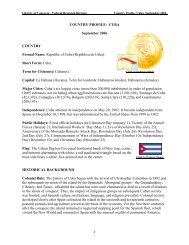1 - American Memory
1 - American Memory
1 - American Memory
You also want an ePaper? Increase the reach of your titles
YUMPU automatically turns print PDFs into web optimized ePapers that Google loves.
224<br />
the prestrike period of frantic stockpiling; and the poststrike period of<br />
getting business back to normal and you have about 6 years of disrup-<br />
tion due to transportation disputes—neariy one-fourth of the time<br />
since 1946.<br />
This unique situation has produced an illogical but understandable<br />
reaction in the people of Hawaii. The immediate eflfect of an impend-<br />
ing strike is panic in an otherwise gentle and reasonable people. Super-<br />
market shelves are rapidly depleted as those who can afford it begin<br />
hoarding the more important staples. Others who can ill afford it will<br />
sacrifice elsewhere in order to hoard the necessities. And those who<br />
simply cannot afford to hoard wish they could.<br />
For example, a Kalihi laborer who earns $3,500 a year said in an<br />
interview during the 1971 strike that he wanted to stockpile rice to<br />
feed his wife and three children. "But I just couldn't afford it," he<br />
said. "I live day-to-day and week-to-week. If we run out of rice, I<br />
guess that's it. We just run out of rice."<br />
Mr. Chairman, we haven't run out of rice yet, but the fear is real<br />
and the fatalism of the Kalihi laborer tragic. He has no part in a dis-<br />
pute 2,400 miles away. His only role is to suffer. Hoarding, of course,<br />
IS foolish because it creates a false and unnecessary shortage, but the<br />
instinct to survive appears to be stronger than good sense.<br />
But even without hoarders, an extended series of strikes such as we<br />
had in 1971-72 creates serious shortages. The headlines of that tintie<br />
present a graphic picture of the situation:<br />
MARKET SUPPLIES DEPLETED (TOILET TISSTTE, SALT,<br />
MAYONNAISE, RICE). DOCK STRIKE CASUALTY—<br />
OROWEAT TO CIvOSE: STRIKE CLOSES T^^'^O FFRNI-<br />
TITRE STORES. MAT'I MOCHI PLANT HITRT BY STRIKE.<br />
STRIKE CAUSES LAYOFFS AT TUNA PLANT. TOTI^ET<br />
PAPER NEARLY OITT IN MATTI. WHO CAN SURVIVE<br />
STRIKE THE CANDY MAN CANT. CHRISTMAS TREE<br />
SHORTAGE SEEN. STATE TO PAY FOR RELIEF RICE.<br />
It is inconvenient when you can't buy tissue paper or mayonnaise<br />
or even salt. But it is serious when you can't buy toilet paper. It is<br />
serious when your rice supply is low, and for the poor it is grave when<br />
the limited supply of rice is so expensive, and you are out of a job<br />
because the shortage of material has closed a business.<br />
Inevitably when the supermarket shelves are low. prices rise. We<br />
have lived for many years with the fact of the high cost of living.<br />
We know that it is the consumer who has to pay the costs of shipping<br />
to our island State so far from the mainland coast. We know how this<br />
affects our housing, our clothing, our transportation, our food because<br />
almost everything we consume is imported.<br />
According to the Department of Labor's report on retail food<br />
prices in the Pacific region, in June 1971, when the west coa.st strike<br />
began, Honolulu paid 72 cents for a half-gallon of milk while Los<br />
Angeles paid .'iS cents; chicken was 69 cents a pound in Honolulu<br />
and 40 cents in Ix)s Angeles; lettuce was 47 cents to Los Angeles' 27<br />
cents; and round steak, a hixurv, was $1.30 a pound to Los Angeles'<br />
$1.26. You can see there is a great disparity in these prices.<br />
A year and a half of strikes later, in December 1972, the report shows<br />
that milk in Honolulu went up to 76 cents but remained unchanged



![Albert Einstein Papers [finding aid]. Library of Congress. [PDF ...](https://img.yumpu.com/21604228/1/190x245/albert-einstein-papers-finding-aid-library-of-congress-pdf-.jpg?quality=85)





![American Colony in Jerusalem Collection [finding aid]. Library of ...](https://img.yumpu.com/17941275/1/190x245/american-colony-in-jerusalem-collection-finding-aid-library-of-.jpg?quality=85)



![Piccard Family Papers [finding aid]. - American Memory - Library of ...](https://img.yumpu.com/17941234/1/190x245/piccard-family-papers-finding-aid-american-memory-library-of-.jpg?quality=85)


